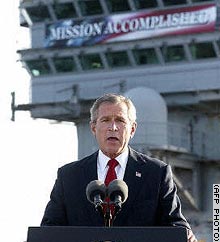
W.J. Astore
Donald Trump and Kellyanne Conway didn’t invent alternative facts. The U.S. government has been peddling those for decades. Consider the recent history of the Iraq War. Recall that in 2002 it was a “slam dunk” case that Iraq had active programs to develop weapons of mass destruction (WMD). (We couldn’t allow the smoking gun to become a mushroom cloud, said Condoleezza Rice.) In 2003, President George W. Bush landed on an aircraft carrier and declared that major combat operations were over in Iraq – mission accomplished! And in 2007, the “surge” orchestrated by General David Petraeus was sold as snatching victory from the jaws of defeat in Iraq. All of those are “alternative facts.” All were contradicted by the facts on the ground.
Nowadays, most people admit Iraq had no active WMD programs in 2002 and that the mission wasn’t accomplished in 2003, but the success of the surge in 2007 is still being sold as truth, notes Danny Sjursen at TomDispatch.com. Sjursen, who participated in the surge as a young Army lieutenant, notes that it did succeed in temporarily reducing sectarian violence in Iraq, but that was precisely the problem: it was temporary. The surge was supposed to allow space for a stable and representative Iraqi government to emerge, but that never happened.
A short-term tactical success, the surge was a strategic failure in the long-term. Partly this was because long-term success was never in American hands to achieve, and it certainly wasn’t attainable by U.S. military action alone. In sum, the blood and treasure spilled in Iraq was for naught. But that harsh truth hasn’t stopped the surge from becoming a myth of U.S. military triumph, one that led to another unsuccessful surge, this time in Afghanistan in 2009-10, also conducted by General Petraeus.
These surges sustain an alternative fact that the U.S. military can “win” messy insurgencies and sectarian/ethnic wars, whether in Iraq or Afghanistan or Libya or Yemen or elsewhere. They contribute to hubris and the idea we can remake the world by using our military, a belief that President Trump and his bevy of generals (all veterans of Iraq and Afghanistan) seem to share and want to put into practice again. This time, they promise to get it right.
The President and the Pentagon are currently considering sending several thousand more troops to Afghanistan. This mini-surge is being advertised as America’s best chance of defeating terrorists in the AfPak region. Even though previous, and much bigger, surges in Iraq and Afghanistan were failures, the alternative fact narrative of “successful” surges remains compelling, even authoritative, among U.S. national security experts. They may grudgingly admit that, yes, those previous surges weren’t quite perfect, but we’ve learned from those – promise!
Prepare for more troop deployments and more surges, America. And for more “victories” as alternative facts, as in lies.


One thought on “The Iraqi Surge and Alternative Facts”
Comments are closed.